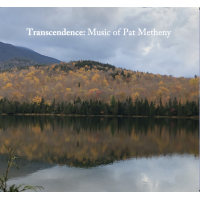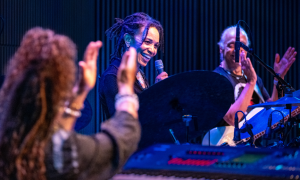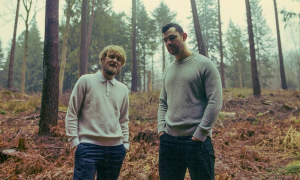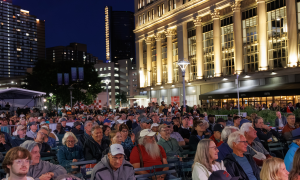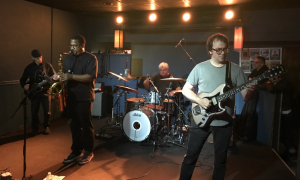Home » Jazz Articles » Live Review » John McLaughlin/Chick Corea: Five Peace Band, Montreal, ...
John McLaughlin/Chick Corea: Five Peace Band, Montreal, Canada, April 28, 2009
 John McLaughlin / Chick Corea
John McLaughlin / Chick CoreaFive Peace Band
Salle Wilfred-Pelletier
Montreal, Canada
April 28, 2009
The chance to experience the evolution of a one-time group over the course of a single tour is a rare one. Even if a live album is released, it's more often than not recorded towards the end of the tour, capturing the group at its supposed best. For legendary artists 
Chick Corea
piano1941 - 2021

John McLaughlin
guitarb.1942
As good as those early shows were, the quintet's performance in Montreal, Canada on April 28, 2009 (sponsored by the Festival International de Jazz de Montreal) demonstrated the benefits of clocking up a lot of performances in a concentrated period of time. While there was much to compare to the live album, there was also plenty that was different, the most obvious being 
Brian Blade
drums
b.1970
Vinnie Colaiuta
drums
b.1956
By contrast, Blade has always been capable of similar powerhouse drumming in addition to far greater subtlety, but more often in looser, more open-ended ways that have made him the drummer of choice for freer-thinking groups like 
Wayne Shorter
saxophone
1933 - 2023
Joni Mitchell
vocals
b.1943
Bob Dylan
guitar and vocals
b.1941
The change of a single member—coupled with the greater comfort level and deeper chemistry of a group nearing the end of a total of five months touring—can often significantly alter the complexion of a band, and while there was much to compare between the performance and live album, the Blade version of Five Peace Band veered farther away from more conventional fusion towards a place where the energy of electric instruments entered a more liberated improvisational place.
Less about soloing over firm structure (though there was plenty of form to be found) and more about using Corea and McLaughlin's compositions as leaping off points for an "anything goes" musical aesthetic, the Montreal show might have disappointed more fervent fusion fans. But for those disposed to hearing a group take innumerable risks—some working better than others, to be sure, but all of them well worth experiencing—the performance couldn't have been better. Playing for over three hours (including a brief intermission), Five Peace Band—which also features über-bassist 
Christian McBride
bass
b.1972
Miles Davis
trumpet
1926 - 1991
Kenny Garrett
saxophone, alto
b.1960
 l:r: Chick Corea, John McLaughlin, Christian McBride, Brian Blade, Kenny Garrett
l:r: Chick Corea, John McLaughlin, Christian McBride, Brian Blade, Kenny Garrett
Garrett's capacity to build solos to fever pitch remained intact, with his by now almost signature ability to take a single note and work it to the point where, when he finally moved on, there was palpable cathartic relief in the audience, a strength within the group that countered McLaughlin's lengthy, high velocity lines. But Garrett also played with considerably greater restraint, especially on Corea's "The Disguise," the most (at times) overtly swinging tune of the set. And his alto meshed almost completely with McLaughlin's often overdriven tone, creating a distinctive single voice that would then break off again to two discrete personalities for potent solos on McLaughlin's high octane "Raju."
McBride stayed mostly with electric bass, although he did contribute some lyrical arco on his acoustic during the lengthy intro to "Hymn to Andromeda." On electric he was a perfect foil for McLaughlin, countering the guitarist's lean phrases with lightning fast lines of his own, even as he managed to keep the groove moving forward relentlessly on the slower, more visceral pulse of McLaughlin's "New Blues, Old Bruise."
As ever, watching Blade was like witnessing a force of nature. Seated low in relation to his kit, he thundered through the material with a power that was less overtly groove-laden and more free-thinking, though he still managed to suggest—either directly or indirectly—the fast samba pulse of McLaughlin's "Señor C.S.," the guitarist's tribute to Carlos Santana first heard on Industrial Zen (Verve, 2006). Not since the late Tony Williams has there been a drummer so unfettered, capable of playing with great nuance and explosive punctuations that consistently avoid being non sequiturs.
As on his 2007 tour with his 4th Dimension group, recently documented on Live @ Belgrade (Abstract Logix, 2009) DVD, McLaughlin blended staggering and seemingly endless ideas at high speed with increased use of harmonics and whammy bar bends. Despite his often unparalleled speed and blinding virtuosity, McLaughlin has been waxing more lyrical in recent years, and his gritty yet motif-centric solo on "New Blues, Old Bruise" was a highlight of the evening. McLaughlin also proved himself to be the outstanding rhythm guitarist he's rarely thought of, with distinctive voicings and chunky rhythms working in tandem with McBride and Blade throughout the set.
As much as Blade brought a greater sense of freedom to the group, it seemed as though Corea responded to the drummer's expansive approach more fervently than anyone else in the group. His solo piano work on "The Disguise" and especially "Hymn to Andromeda" was as abstract as anything he's done. For a pianist who has aimed at accessibility for most of his career, he appears to be moving back to greater abandon, pushing the group in completely unexpected directions. On synth, as with his Return to Forever reunion tour in 2008, Corea demonstrated a broader palette that referenced some of his '70s tones but also looked forward with more unfamiliar textures.
 With a first set consisting of only three tunes in approximately 70 minutes, and a second set running over 75 minutes with only two tunes, it's no surprise that when the group was called back for its encore, it played a more abbreviated version of "In a Silent Way/It's About That Time," from Miles Davis' In a Silent Way (Columbia, 1969) than that on the live album. Still, it went from abstract lyricism—with Corea's piano and synth perfectly complementing McLaughlin's poignant theme—to unrelenting pulse, as the group coalesced around its straightforward groove to, once again, open the tune up to greater possibilities than Corea and McLaughlin might have considered when they played it with Davis 40 years ago.
With a first set consisting of only three tunes in approximately 70 minutes, and a second set running over 75 minutes with only two tunes, it's no surprise that when the group was called back for its encore, it played a more abbreviated version of "In a Silent Way/It's About That Time," from Miles Davis' In a Silent Way (Columbia, 1969) than that on the live album. Still, it went from abstract lyricism—with Corea's piano and synth perfectly complementing McLaughlin's poignant theme—to unrelenting pulse, as the group coalesced around its straightforward groove to, once again, open the tune up to greater possibilities than Corea and McLaughlin might have considered when they played it with Davis 40 years ago.
With standing ovations throughout the evening it was clear that, despite its freer approach to the material, the audience remained with the group throughout the journey. Montreal has always had one of the most receptive and open-minded audiences in the world, and while there may have been some disappointed fusion-heads, Corea, McLaughlin and Five Peace Band put on a more than memorable performance, making it clear that, in the best improvisational situations, expectations and stylistic rules are meant to be broken, not adhered to.
Photo Credit
John R. Fowler
Tags
Comments
PREVIOUS / NEXT
Support All About Jazz
 All About Jazz has been a pillar of jazz since 1995, championing it as an art form and, more importantly, supporting the musicians who make it. Our enduring commitment has made "AAJ" one of the most culturally important websites of its kind, read by hundreds of thousands of fans, musicians and industry figures every month.
All About Jazz has been a pillar of jazz since 1995, championing it as an art form and, more importantly, supporting the musicians who make it. Our enduring commitment has made "AAJ" one of the most culturally important websites of its kind, read by hundreds of thousands of fans, musicians and industry figures every month.


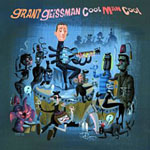
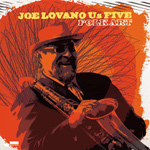

 Buy Now
Buy Now



